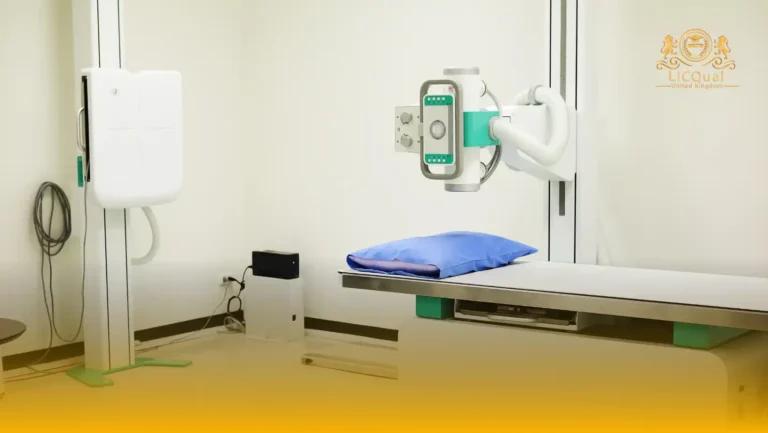The LICQual Level 7 Postgraduate Diploma in Weight Management and Obesity (PgD Weight Management) is an advanced qualification designed to equip professionals with the expertise to address one of the most pressing health challenges of modern society. This programme provides learners with in-depth knowledge of the scientific, clinical, and behavioral approaches to effective weight management and obesity prevention.
This postgraduate diploma is not intended for fresh candidates but is tailored to experienced professionals who are seeking to enhance their career prospects, broaden their understanding, and strengthen their Continuing Professional Development (CPD). It focuses on developing advanced skills in nutritional assessment, obesity interventions, behavioral change strategies, and evidence-based therapeutic practices. By completing this qualification, learners will be well-positioned to lead in clinical, community, and wellness settings, delivering sustainable solutions to improve health outcomes.
Centres delivering this qualification must ensure the provision of competent and qualified staff, supported by all the necessary teaching materials, research tools, and resources to provide high-quality training. A strong commitment to academic excellence, professional guidance, and learner support is essential to maintain the integrity and success of this programme.
The PgD in Weight Management and Obesity is ideal for nutritionists, dietitians, healthcare practitioners, and wellness professionals who wish to specialize in advanced weight management strategies. With a focus on practical application, critical research, and ethical practice, this qualification empowers learners to make a meaningful impact in the fight against obesity at both individual and population levels.
Course Overview
Qualification Title
LICQual Level 7 Postgraduate Diploma in Weight Management and Obesity (PgD Weight Management)
Total Units
6
Total Credits
120
GLH
600
Qualification #
LICQ2201111
Qualification Specification
To enroll in the LICQual Level 7 Postgraduate Diploma in Weight Management and Obesity (PgD Weight Management), applicants must meet the following criteria:
|
Qualification# |
Unit Title |
Credits |
GLH |
|---|---|---|---|
|
LICQ2201111-1 |
Advanced Science of Weight Management and Obesity |
20 |
100 |
|
LICQ2201111-2 |
Nutritional Strategies for Weight Management |
20 |
100 |
|
LICQ2201111-3 |
Behavioral and Psychological Approaches in Obesity Management |
20 |
100 |
|
LICQ2201111-4 |
Clinical and Medical Interventions for Obesity |
20 |
100 |
|
LICQ2201111-5 |
Research Methods and Evidence-Based Practice in Weight Management |
20 |
100 |
|
LICQ2201111-6 |
Professional Practice, Ethics, and Public Health Approaches |
20 |
100 |
By the end of this course, learners will be able to:
Unit 1: Advanced Science of Weight Management and Obesity
By the end of this unit, learners will be able to:
- Critically analyse the genetic, physiological, and metabolic determinants of body weight.
- Evaluate the global impact of obesity as a major public health challenge.
- Apply advanced knowledge of biological mechanisms to the development of weight management strategies.
Unit 2: Nutritional Strategies for Weight Management
By the end of this unit, learners will be able to:
- Design personalised nutrition plans based on scientific evidence.
- Assess the role of macro- and micronutrients in obesity management and prevention.
- Evaluate the effectiveness of dietary interventions for weight reduction and long-term maintenance.
Unit 3: Behavioural and Psychological Approaches in Obesity Management
By the end of this unit, learners will be able to:
- Apply behavioural change theories and counselling techniques in obesity management.
- Critically evaluate the psychological factors influencing eating behaviours and weight control.
- Develop interventions that address emotional and disordered eating patterns.
Unit 4: Clinical and Medical Interventions for Obesity
By the end of this unit, learners will be able to:
- Assess the role of pharmacological and surgical interventions in obesity management.
- Evaluate clinical approaches to multidisciplinary obesity treatment.
- Analyse the ethical and professional considerations surrounding medical interventions.
Unit 5: Research Methods and Evidence-Based Practice in Weight Management
By the end of this unit, learners will be able to:
- Critically appraise current scientific research in obesity and weight management.
- Apply advanced research methods to investigate weight management challenges.
- Design and present evidence-based research projects relevant to professional practice.
Unit 6: Professional Practice, Ethics, and Public Health Approaches
By the end of this unit, learners will be able to:
- Demonstrate ethical and professional practice in weight management interventions.
- Evaluate the role of nutrition professionals in community health and obesity prevention programmes.
- Reflect on professional practice to enhance CPD and lifelong learning.
The LICQual Level 7 Postgraduate Diploma in Weight Management and Obesity (PgD Weight Management) is designed for healthcare professionals, dietitians, nutritionists, and wellness practitioners seeking advanced knowledge and practical skills in obesity management and weight control. This course is ideal for those aiming to improve client outcomes, apply evidence-based interventions, and advance their careers in clinical, wellness, or public health settings.
Dietitians and Nutritionists
• Qualified dietitians seeking specialization in weight management
• Nutritionists aiming to deliver personalized weight loss programs
• Professionals involved in metabolic assessment and dietary planning
• Graduates pursuing internationally recognized Level 7 qualification
• Practitioners enhancing credibility in clinical nutrition
• Individuals preparing for leadership or advisory roles in weight management
Healthcare and Medical Professionals
• Nurses and allied health professionals supporting weight management programs
• Doctors integrating lifestyle and nutrition strategies into patient care
• Clinical staff managing obesity-related chronic conditions
• Professionals involved in dietary and metabolic intervention programs
• Practitioners aiming to improve patient adherence and outcomes
• Healthcare professionals seeking evidence-based weight management knowledge
Wellness and Fitness Practitioners
• Personal trainers integrating nutrition and lifestyle interventions
• Health coaches supporting sustainable weight loss and behavior change
• Fitness professionals delivering personalized nutrition and exercise programs
• Practitioners aiming to specialize in metabolic health and obesity care
• Professionals targeting holistic wellness and weight management roles
• Individuals enhancing client engagement and compliance
Public Health and Community Professionals
• Public health workers developing obesity prevention initiatives
• Community health practitioners implementing dietary intervention programs
• NGO staff delivering evidence-based health and nutrition programs
• Program coordinators managing population-level weight management projects
• Professionals working on community health promotion campaigns
• Individuals contributing to public health awareness on obesity
Graduates Seeking Postgraduate Specialization
• Health science or nutrition graduates pursuing advanced study
• Graduates preparing for careers in clinical or therapeutic nutrition
• Individuals aiming for Level 7 qualification for career progression
• Professionals transitioning into obesity and weight management roles
• Students seeking practical, evidence-based skills in weight management
• Learners targeting international recognition and career mobility
Educators, Trainers, and Policy Professionals
• Health educators teaching weight management and obesity topics
• Trainers delivering evidence-based nutrition and lifestyle programs
• Policy makers developing dietary and wellness guidelines
• Academic staff seeking subject-specific specialization
• Professionals designing educational resources for weight management
• Advisors supporting evidence-based obesity prevention programs
Career Changers and International Learners
• Professionals transitioning into weight management and wellness careers
• Individuals seeking flexible, globally recognized Level 7 qualifications
• Learners aiming to work in clinical, wellness, or research settings
• Professionals targeting career advancement and skill specialization
• Individuals committed to evidence-based weight management practice
• Learners aspiring to improve client health outcomes and lifestyle behavior
Centres offering the LICQual Level 7 Postgraduate Diploma in Weight Management and Obesity must meet defined standards to ensure high-quality delivery, learner success, and professional credibility. To deliver this programme effectively, centres are required to provide:
- Qualified and Experienced Staff
Trainers, assessors, and academic staff must hold relevant qualifications in nutrition, dietetics, health sciences, or related fields, along with practical experience in weight management and obesity care. - Comprehensive Learning Resources
Centres must provide access to updated course materials, scientific literature, case studies, and digital learning platforms to support advanced study and evidence-based practice. - Appropriate Learning Facilities
Centres should offer modern classroom environments or online platforms equipped with the necessary teaching tools and technologies to deliver engaging and interactive sessions. - Robust Quality Assurance Systems
Internal quality assurance mechanisms must be in place to monitor delivery standards, ensure fair and consistent assessment, and maintain compliance with academic requirements. - Learner Support Services
Centres must offer academic guidance, research support, and pastoral care to help learners progress successfully through the qualification. - Commitment to CPD and Professional Excellence
Centres should encourage a culture of Continuing Professional Development (CPD), ensuring learners have opportunities to engage in reflective practice, research, and professional growth.
By meeting these requirements, centres can deliver a world-class learning experience, equipping learners with the advanced skills and knowledge needed to make a real impact in weight management and obesity prevention.
Assessment and Verification
All units within this qualification are subject to internal assessment by the approved centre and external verification by LICQual. The qualification follows a criterion-referenced assessment approach, ensuring that learners meet all specified learning outcomes.
To achieve a ‘Pass’ in any unit, learners must provide valid, sufficient, and authentic evidence demonstrating their attainment of all learning outcomes and compliance with the prescribed assessment criteria. The Assessor is responsible for evaluating the evidence and determining whether the learner has successfully met the required standards.
Assessors must maintain a clear and comprehensive audit trail, documenting the basis for their assessment decisions to ensure transparency, consistency, and compliance with quality assurance requirements.







